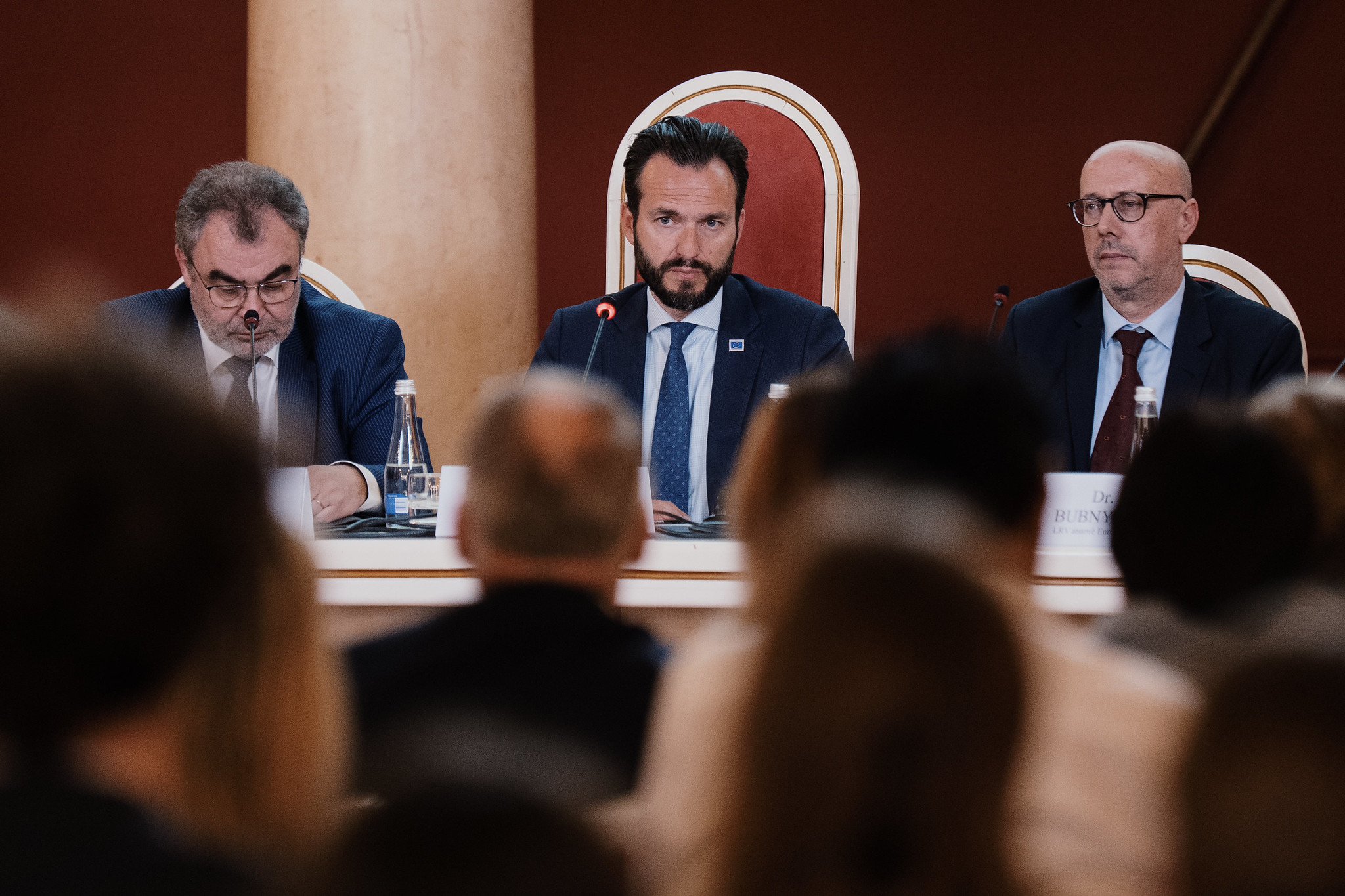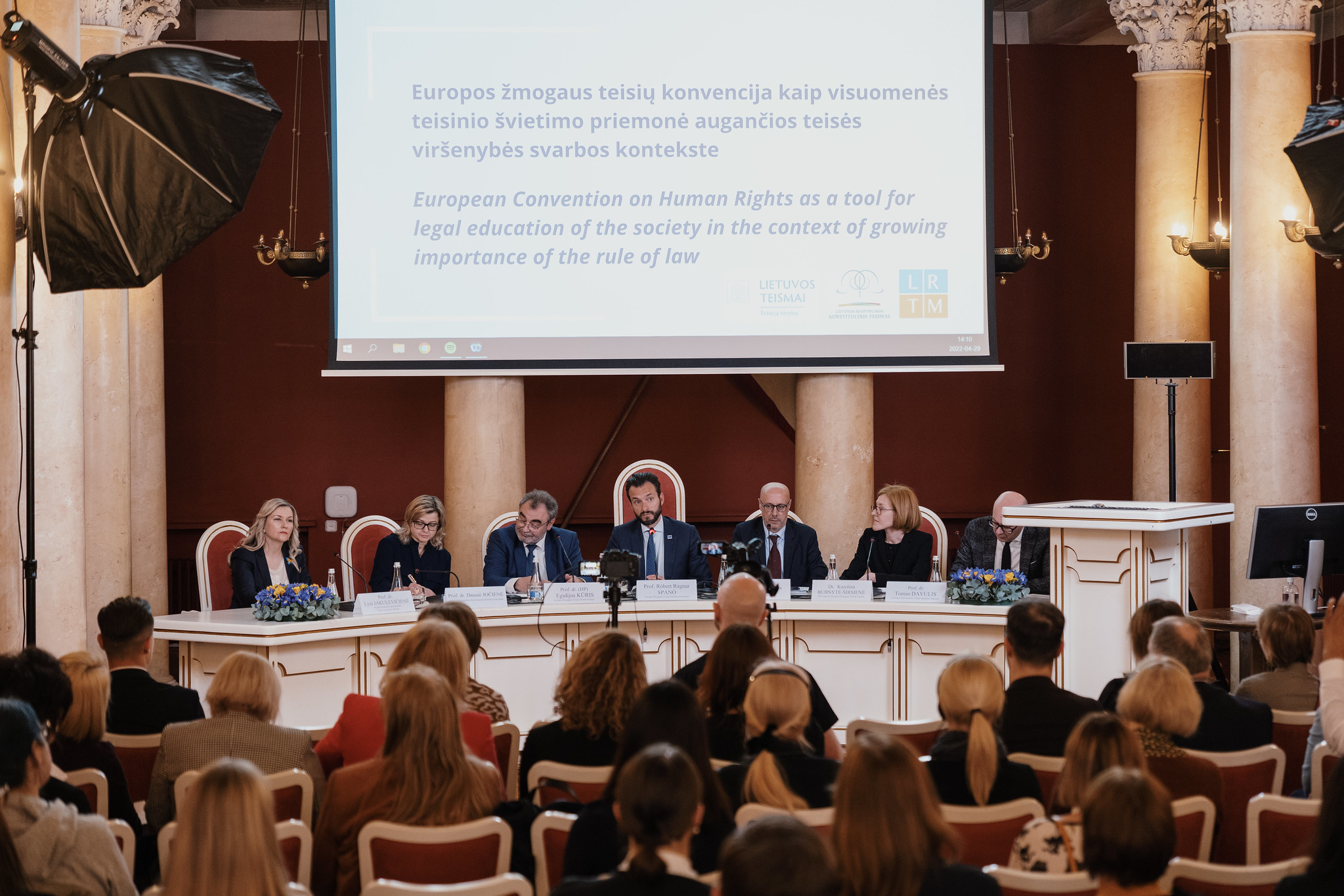Is the European Convention on Human Rights Effective in Relation to the War in Ukraine?
 The COVID-19 pandemic, as well as the regional crisis of migrants on the border with Belarus and the war in Ukraine, have posed unprecedented challenges for humanity and for human rights, leading us to search for answers to the most complex legal issues and human values. How relevant and significant is the European Convention on Human Rights in this regard? Should we continue trying to live by the principles it protects? These were among the questions raised during the roundtable discussion titled “Convention on Human Rights as a Tool for Legal Education of the Public in the Context of the Growing Importance of the Rule of Law” hosted by Vilnius University.
The COVID-19 pandemic, as well as the regional crisis of migrants on the border with Belarus and the war in Ukraine, have posed unprecedented challenges for humanity and for human rights, leading us to search for answers to the most complex legal issues and human values. How relevant and significant is the European Convention on Human Rights in this regard? Should we continue trying to live by the principles it protects? These were among the questions raised during the roundtable discussion titled “Convention on Human Rights as a Tool for Legal Education of the Public in the Context of the Growing Importance of the Rule of Law” hosted by Vilnius University.
President of the European Court of Human Rights (ECtHR ), Robert Spano, launched the discussion. He spoke about the ways the pandemic has affected European law in the context of the Convention. According to him, the Convention has suffered a major shock: “The first principles of any rule of law are respect for human rights and legitimacy. The pandemic forced us to make very rapid decisions. Governments had to consider scientific data that was just starting to become clear at the time, so the decisions were based on vague evidence and an unclear regulatory framework. It is in these situations that the Convention has faced serious challenges.”
According to the President of the ECtHR, the pandemic has raised many sensitive issues, such as the compulsory vaccination of children against communicable diseases and ensuring the health of the elderly. The courts will have to assess to what extent the governmental response has been commensurate with the threat posed by the pandemic.
“The Convention must not only address the problems caused by mankind, but also by natural phenomena and disasters. The process may work a little differently when it comes to the effects of natural phenomena, but time will tell what decisions will be made in the national and European courts,” R. Spano explained.
The judge also discussed the war in Ukraine, describing Russia’s actions in the country as causing the greatest damage to world order. However, according to him, current events do not mean that the Convention is not working.
“The Convention is a system based on the voluntary actions of its members. The Convention itself is just words on paper. The constitution may contain the most beautiful statements in all the provisions of the United Nations, but the people must defend those words and live by them. When rockets are launched, targeting people’s homes, no law will be able to prevent that,” he said.
R. Spano also spoke about the ECtHR’s actions in the context of war: “The ECtHR will respond as a court. We have the jurisdiction to hear cases brought against the Russian Federation for violations of human rights committed while the Convention was in force for Russia, i.e. until 16 September 2022. These decisions will be very complex. The principles of human rights are now paramount, so we have to take the opportunity to respond more strongly. Democracy and human rights are not a matter of course. We must take action to defend them.”
The President of the Constitutional Court, Danutė Jočienė, spoke about the relationship between the ECtHR, the Convention and Lithuanian law. According to her, the Convention is the treaty that has had the greatest affect on the Lithuanian human rights system, adding that the relationship between the Convention and the Lithuanian legal system is a friendly one.
“We have grown to be friendly towards our international commitments. Our court often relies on the case law of the ECtHR and we have great respect for the international courts. The Constitutional Court has repeatedly emphasised an important principle: the geopolitical orientation of Lithuania is toward a constitutional state, meaning membership in NATO and compliance with the EU’s international obligations,” D. Jočienė said.
According to Lyra Jakulevičienė, Dean of the Law School at Mykolas Romeris University, the pandemic has not set a precedent that will completely change the balance and values enshrined in the Convention. According to her, all courts have generally justified the measures taken by governments, taking into account the principle of social solidarity and stating that individuals themselves must be held accountable. However, it is too soon to draw conclusions due to the lack of practice.

However, she saw a different trend in relation to the migration crisis: “The ECtHR practice has certainly undergone a rapid development. The key issue was the return policy, and we have seen changes in the jurisprudence. Things like people’s behaviour were taken into account; for example, whether they took part in the raids or applied for asylum in a legal way. We will continue to see many interesting decisions in the future.
Prof. Tomas Davulis, Dean of the Faculty of Law at Vilnius University, also discussed the significance of the Convention and its contribution to the democratic world. According to him, the Convention and the ECtHR reflect the public’s strong aspiration to be European. The both have enabled politicians and judges to make very important and difficult decisions: “Undoubtedly, this is a great achievement of civilisation. It is a guarantor that allows us to believe in the future and to fearlessly build it, both individually and collectively. I am also fascinated by the dynamics of the constitution, as we can see from practical examples how the activities of the ECtHR have also changed the content of the provisions of our constitution, giving it the contemporary feel it needs in the 20th century and adding previously unwritten sentences that do not limit but defend our rights. This law-making system is becoming multifaceted, as opposed to monopolistic, omniscient and controlling.”
Lithuanian judge at the ECtHR, Egidijus Kūris, noted the power of the law and the Convention in responding to emerging challenges: “I think the law could provide the answer when it comes to the Convention and other documents. While I or other lawyers may not like some of the wording, it does have some common denominators and it sets certain boundaries. However, if a country’s citizens do not want to live by these rules, their power becomes very limited.”
Deputy Registrar of the ECtHR, Abel Campos, while visiting Lithuania, discussed the importance of the Convention and stated that it has set a positive standard in Europe, as well as noting that the current events do not mean that it has failed.
“It is very difficult to play together when one of the players refuses to follow the rules. That is exactly what has happened. One of the players has completely abandoned the rules and started his own game. As a community, we cannot and will not accept this. However, one country’s failure to comply with the rules does not mean that the whole system has collapsed. It means that something has happened that makes the measure no longer 100% effective, so we must think about the things we could do to make the rules work for everyone. That is what we are trying to ensure,” A. Campos said.
This discussion took place during the visit of the ECtHR President, R. Spano, to Lithuania. The discussion was organised by the Ministry of Justice of the Republic of Lithuania in cooperation with the Constitutional Court, Judicial Council and Vilnius University.